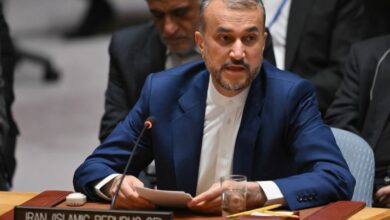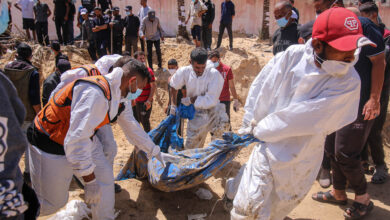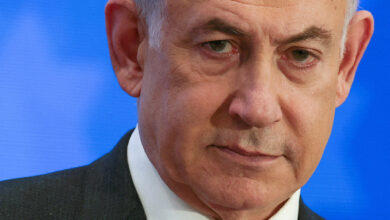Washington–US President Barack Obama’s Nuclear Security Summit was a high-yield event for Israel, with little of the diplomatic fallout that made the country’s leaders duck such forums in the past.
But it may be only a fleeting reprieve for the decades-old, US-tolerated secrecy around Israel’s assumed atomic arsenal.
Obama’s drive to eliminate weapons of mass destruction and, more immediately, to defuse tinderbox Middle East standoffs will mean increased pressure on Israel to scrap its self-styled policy of nuclear "ambiguity" or "opacity," some analysts say.
With the two-day Washington summit concluded and largely bereft of Israel-bashing, eyes are on next month’s UN review of the 1970 nuclear Non-Proliferation Treaty (NPT) — which Israel never signed, to the chagrin of many Arabs and Muslims.
Diplomats predict that powers like Egypt, having bit their tongues under the Nuclear Security Summit’s narrow, non-binding counter-terrorism agenda, will use the three-week-long New York meeting to redouble calls for a Middle East free of weapons of mass destruction, or WMDs.
There is no desire among Israel’s mostly hostile neighbors to let it savor having joined 46 other nations in pledging to be responsible nuclear players — and, by extension, condemning Iran and Syria, Israeli arch-foes excluded from the summit.
Israel’s delegate, Deputy Prime Minister Dan Meridor, voiced satisfaction at how he was received. "There was no drama," he told Reuters. "Everyone knows we’re not a proliferation threat."
Asked how Israel’s having participated might affect the NPT Review, Meridor said: "I expect it will be a tough event."
He would not speculate on whether the United States, which has tacitly backed Israel’s demand that disarmament be predicated on Middle East peace, might now try a different tack.
Summarizing the summit, Obama declined to comment on Israel’s nuclear policies but reminded reporters of a long-standing US call for universal membership to the NPT.
Feeling stonewalled by Israeli Prime Minister Benjamin Netanyahu’s approach to peacemaking with the Palestinians, Obama may now prefer to entrain Israel in the gathering diplomatic momentum against Iran’s nuclear program and other challenges.
"The more progress Obama makes, the more difficult it will become for Israel to sustain its ‘ambiguity’ in diplomatic circles," said Ian Kearns, senior fellow at the Royal United Services Institute for Defence and Security Studies in London.
"If we get to the end of May, and the NPT Review reaches some kind of agreement without discussing the WMD-Free Zone, then I’d say the Israelis will have had a pretty easy ride."
Netanyahu decided last week against attending the Nuclear Security Summit himself, with aides citing concern that Israel could be singled out for criticism. As it happened, the censure was muted, and some Israeli commentators accused Netanyahu of shying from a face-off with Obama over stalled Palestinian talks.
Netanyahu’s withdrawal was especially surprising given the fact Israeli officials invested six months in preparations with the Americans to ensure the summit communiqué would not contain language problematic for Israel’s nuclear policies.
"The NPT Review is just weeks away, and of course we expect the Americans to stick up for us," said one recently retired official. "But now they may be thinking, ‘If Israel doesn’t stick up for itself, then why should we?’"
Any US attempt to broach NPT membership for Israel could be stymied by questions about the more salient non-signatories India and Pakistan, which — unlike the Israelis — have openly tested nuclear weapons and mooted their use in war.
The Nuclear Security Summit, with its emphasis on monitoring fissile materials, will promote another Obama initiative: finalizing an accord to end state production of such materials. That would throw a spotlight on Israel’s Dimona reactor, with its suspected output of plutonium for as many as 200 bombs.
Meridor said he knew of no US overture toward Israel about the Fissile Material Cut-off Treaty, and noted that past efforts to pass it were blocked at the outset by Pakistani objections.
"This (initiative) is not new," Meridor said. "We haven’t said anything about it."
Israel neither confirms nor denies having the region’s only nuclear weapons, saying this reticence wards off enemies — and affirms the permanence of a Jewish state born of the Holocaust — while avoiding the provocations that can trigger arms races.
Avner Cohen, author of the seminal study "Israel and the Bomb" and a soon to be published follow-up, "The Worst Kept Secret," said the Nuclear Security Summit could underscore what he described as tension between the policy’s obsolescence and the continued, tacit acquiescence it enjoys from Washington.
"Israel has been granted legitimacy as a responsible nuclear stakeholder" by the summit, Cohen said.
But he added: "In the international community at large — and I’m not talking only about governments, but also about NGOs, the public, media and academics — there is a growing sense that ‘opacity’ has grown tiresome and anachronistic, and is incompatible with today’s norms and rules of conduct."




